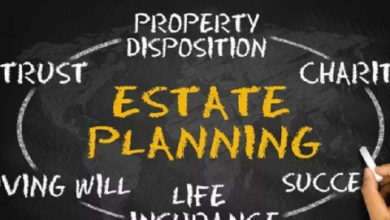Estate Planning Checklist Of The Basics

While no one likes to discuss their end-of-life decisions, having a plan regarding how things will proceed after your death can save your family from a series of troubles. And in that regard, estate planning is essential.
So, what’s estate planning?
When you prepare your estate, you decide what will happen to your possessions in the event of your death or incapacity. One goal is to ensure assets are transferred to heirs and beneficiaries in a way that minimizes or eliminates tax liability.
Estate planning entails more than just making a will. Part of being well-prepared is ensuring your assets are easily transferred to the people or causes you care about. You need to do more than just follow through on your strategy; you also need to make sure other people are aware of it and understand what you’re trying to accomplish.
Fortunately, we’re here to lay out some of the basics of estate planning so you can secure your assets and build an effective plan. Let’s get started.
-
Count your assets.
Everything you own is regarded as a component of your estate, and you must decide how to treat the various goods. You can’t do this by yourself. That is why we advise you to seek estate planning services and start planning now so that you and your family can be at peace. Your estate planner can help you determine if you should sell your real estate and add the proceeds to your other estate assets or whether it should be left to heirs.
Also, you’ll be able to determine how art, jewelry, collectibles, antiques, and other assets should be passed on and create a record of their location. Finally, gather recent statements for any brokerage, bank, retirement, and other accounts to let your heirs know where your money is. This information will be helpful when drafting your estate plan and for your heirs, who will need to gather your estate assets.
-
Work with a tax advisor or an attorney.
For your estate plan, it’s crucial to consult an attorney and perhaps a tax counselor. The attorney’s job will assist you in drafting the essential estate planning documents. A power of attorney, a health care proxy, and a will are a few examples. As for your tax advisor, they can help you resolve any related tax problems.
You will decide, but your tax advisor and a lawyer can assist you in considering and comprehending the occasionally complicated ramifications of each choice. They will also help you express your desires adequately, minimize taxes, avoid errors, and modify your plans as time passes. A thorough, well-informed plan can result in significant savings, so hiring a tax expert or attorney may be well worth the expense.
-
Making the most of what you leave behind
It’s crucial to seek financial or tax guidance and consider how your estate as a whole and the individual items will pass to your beneficiaries. The ideal choices may change depending on the kind of asset, its quantity, your age, and many other variables. You’ll want to educate yourself about these steps to ensure that you lose as little money as possible to taxes, legal expenses, and additional charges.
-
Take a look at your beneficiaries.
While your preferences may be spelled out in your will and other documents, they might not be all-inclusive.
- Examine your retirement savings and insurance. Beneficiary designations are typically present in retirement plans and insurance policies. So keep track of them and make the appropriate updates. These beneficiary designations may take precedence over a will.
- Be sure the correct individuals receive your stuff.Sometimes people forget who they named as beneficiaries of long-standing policies or funds. So if your ex-spouse is still listed as a beneficiary on your life insurance, your current spouse won’t receive any benefits after you pass away.
- No beneficiary sections should be left empty.In that situation, the state’s property distribution laws may determine an account’s distribution during probate.
- List potential beneficiaries.Suppose your primary beneficiary passes away before you remember to change the primary beneficiary designation. In that case, these backup beneficiaries will be crucial.
-
Review and adjust your strategy
While creating an estate plan is vital, it is also crucial to frequently check the plan (annually is best). It helps to ensure that the plan still represents your objectives. A large change in your number of assets, marriage or separation, the birth of children or grandkids, a shift in your health, or any other major life event may necessitate modifying your plan.
In addition to reviewing your estate plan regularly, you should consult with your estate planning lawyer every five years. They will be aware of any potential effects of federal or state legislative modifications on your plan and whether any changes are necessary. Spending a bit more time on estate planning will pay off in the long run for you and your family in terms of tax and legal efficiency.
-
Leaving a letter is essential.
There are situations when your will should not contain everything you wish to tell your family or other people. You can do it in a different letter. For instance, if you wish to specify the kind of funeral services you want. The letter can also contain a list of treasured things you want specific heirs to receive. Give the letter to a good friend, family member, or your lawyer. These letters may not be legally binding in some areas. Still, your relatives and other close friends will likely respect your desires. So remember to leave a note that contains the rest of your wishes and demands.
Conclusion
That’s a wrap! These were some of the basics of estate planning. We hope this information will nudge you in the direction and motivate you to start planning right away. The unanticipated events may seriously impact you and your family if you don’t. You can protect your family, property, and yourself by correctly managing your assets while you live and after you pass away.





